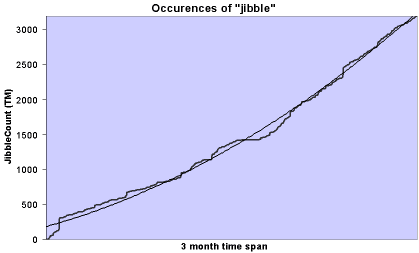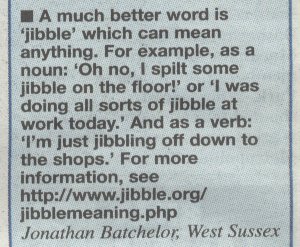The meaning of Jibble
Absurd manifested equivocalness
Welcome. You are about to discover the meaning of the most important word of the future. The future's bright; the future's jibble...
The history of jibble
Jibble is a word that I have been using for quite a few years now. As time has gone on, many of the people I know have started using it, too. It has cultured an international audience, irrespective of language barriers. You may also have noticed that this website is named after said word.
What does jibble mean?
But what does jibble mean? This is the truly beautiful thing about the word - it can mean anything. That's right. It can be a verb or a noun. It could perhaps be some other things, too, but my grasp of the English language is not good enough to know what anything else is called. This is another good reason for using jibble, as there will then be less words for people to learn at school.
Jibble as a noun
The best way to appreciate the meaning of jibble is to observe its use in some everyday examples: -
"Oh no, I spilt some jibble all over the floor!"
"I was doing all sorts of jibble at work today."
"Man, there's a hell of a lot of jibble in that box."
Cool. Now you can impress everyone you know by using this word in everyday life.
Jibble as a verb
Wait, there's more! Yes, you can even use jibble as a verb. That's a "doing word" for the lesser educated. Here are some real life examples of it being used as a verb: -
"I jibbled about with that code and it works now!"
"I'm just jibbling off down to the shops, see ya later!"
So, there you have it. You now know a great word that can be used as both a verb and a noun and it can mean anything. How useful is that?!
The future of jibble
The future of jibble looks promising. I have seen the use of it over the last couple of years grow exponentially. I have even seen students using it as a variable name in their Java programs! It's moments like that when you suddenly realise the potential of the word. Perhaps it might be possible to get it into the dictionary? Let's face it, if "cowabunga" [an exclamation expressing delight] got into the Oxford English Dictionary at one point, then anything can happen.
Numerical analysis
Let's perform a quick bit of numerical analysis to evaluate the feasibility of getting this word into the dictionary.
The word was introduced to an IRC server (see the sharp rise at the start of the graphing period below). The cumulative frequency was monitored and graphed over a three month period. This has been processed using real data obtained from a PircBot log file.

This graph was generated from a log for a channel which has, on average, about 40 users. We can use the trends that we observe to predict the future usage of the word.
We can apply a best fit curve to the graph, of the form y = ax2 + bx + c with a correlation coefficient r2 = 0.9951, thus showing to a good confidence interval that the trend line fits the graph.
At the end of the three months, the gradient of the graph suggests that there were 47.2 jibbles per day produced by the sample selection of 40 people.
We can use the following figures and some mad, quite possibly unjustifiable assumptions to help us out: The number of people on earth is approximately 6000000000 and the average number of words spoken per person per day is 945. This means that 5670000000000 words are spoken every day.
If we extrapolate our 47.2 jibbles per day by 40 people to the population of the planet, then we end up with a total of 7080000000 jibbles per day. This is only 800 times less than the total number of words spoken per day by the whole planet. Effectively, every 1 in 800 words spoken would be "jibble". A standard dictionary contains about 80000 words, so this is compelling evidence that allows us to produce the following conclusion: -
The existence of the word "jibble" in the dictionary is 100 times more justifiable by use than the average word randomly selected from a standard dictionary.
This then begs us to ask just why jibble isn't in the dictionary yet. But If we follow the trends on the graph, then it becomes apparent that by the year 2156, every word spoken will be "jibble", in which case, we won't even have a dictionary. It'll be called a jibble. And every word within that will be jibble. Jibble jibble jibble.
Jibble in Print

On Friday 7th June 2002, "jibble" made it into the papers. This scan was taken from page 13 of the Metro paper, available on the London Underground.
Jibble mistaken as a hacker
A slight misunderstanding by The Register led thousands of people to believe that "Jibble" was not in fact the most versatile word in existence, but really my nickname. No, it's not my nickname (although I am flattered by the gesture). You can read about the story at http://www.theregister.co.uk/content/55/26200.html
Jibble in the New Hacker's Dictionary
On Friday 20th September 2002, the word "jibble" gained an entry in version 4.3.3 of the jargon file, also available in print as The New Hacker's Dictionary. You may view the entry at http://www.catb.org/~esr/jargon/html/J/jibble.html
It is interesting to note that "jibble" has been described as a "deliberate experiment in tracking the spread of a near-meaningless word". I'd never really thought of it like that before, but nonetheless, its appearance in the Jargon File can only increase the popularity of the word!
Search this site
Copyright Paul Mutton 2001-2013
http://www.jibble.org/
Feedback welcomed
![]()

